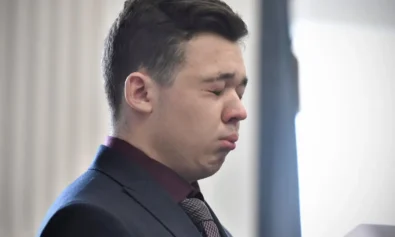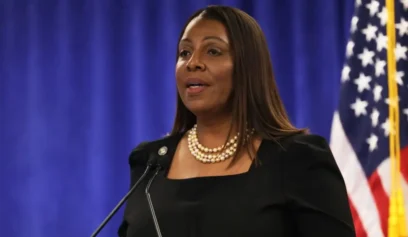Outrage is brewing in England following findings that police were not liable for the death of a Black man, who died while in their custody. The officers claimed the man was lying about not being able to breathe during a fatal asthmatic attack and were caught on camera dismissing his cries for release.
A recently released study by The Independent Officer for Police Conduct highlighted Ian McDonald-Taylor’s death in a summary and excused the officers that were connected to the case of negligence or wrongdoing.
It said, “We found no indication that any person serving with the police may have committed a criminal offense or behaved in a manner that would justify the bringing of disciplinary proceedings.”
The report by the watchdog organization published at the end of August got the story wrong, some people have expressed.
Over three years ago, the 54-year-old was detained after a massive fight.
Officers had the man lying down on the ground on Coldharbour Lane in Brixton on June 29, 2019, with his wrists handcuffed. While they had him prostrate, he is heard on police bodycam yelling out to them, “I’m fading, I’m going to die.” In response to his remarks, one of the police officers said his complaint was “a load of nonsense.”
McDonald-Taylor reportedly was suffering from acute asthma and died from cardiac arrest exacerbated by the incident.
On Wednesday, Sept. 28, the same agency published its annual report on police-involved deaths, documenting the demise of multiple individuals who died during or following their contact with police over the last two years. Eleven deaths were documented in or following police custody, the Daily Mail reports.
Some of their deaths were caught on camera like the death of drill rapper Chris Kaba and Oladeji Omishore, a man suffering from a mental health crisis.
The families of both men believe their police-involved deaths were directly influenced by a systemic prejudice against Black people within the MPD. They are currently working with the charity Inquest to do outreach to the United Nations Office of the High Commissioner for Human Rights to look into both men’s cases.
That’s especially so, considering their 2020 report that affirmed “police brutality” and human rights violations by law enforcement against Africans and people of African descent” in various countries, including the United Kingdom, highlighting the death of another Black Brit by the police named Kevin Clarke.
As a result of the investigation, the IOPC reopened his case and determined the officer used an inappropriate hold on him, causing his death.
The family and supporters of McDonald-Taylor are disappointed the watchdog organization did not see the fingerprint of racism in this death, despite the footage being available.
Bodycam footage played in the courtroom captured him pleading with the cops, saying, “I’m going to die; stand me up now.”
No matter what he said, officers disregarded his petition. One officer was heard reporting to a sergeant that McDonald-Taylor was “currently on the floor playing the whole poor me poor me, he’s going to have to go to the hospital though as a matter of course.”
“He’s saying he has chest pains he can’t breathe blah blah; it’s a load of nonsense but there we go,” he erroneously mocked. In the court documents, the officer’s name is withheld.
McDonald-Taylor repeatedly asked for relief, believing without it he would die. However, he was never extended medical support and was left in the streets without his inhaler.
Eventually, he was transported to a patrol car. Moments after getting into the car, he had a heart attack, prompting officers to call an ambulance to the scene. Later that evening, after he was taken to Kings College Hospital, he died.
McDonald-Taylor’s case was brought to trial and a jury concluded his death was not a result of the officer neglecting to care for him during his attack. He reportedly also died as a result of cardiac arrest, acute asthma, COPD, situational stress, ischemic heart disease and dehydration.
The court was asked to consider a study that said officers are more likely to think a Black person, over a white person, is faking an illness when being apprehended.
Police denied this could be a factor, but did not deny diversity training could be useful in community policing with people of color.
The deceased’s Michael Cooper, commented after the trial, “Watching the video footage of Ian fighting for breath and desperately pleading for help, but being dismissed and even mocked by police officers, is utterly devastating.”
Cooper further questioned if there was any duty of care on the officers’ part.
“The police are trained to deal with situations like this,” the cousin said. “Yet they did not do what anyone else would have done and drive him to a hospital that was three minutes away.”
“No one in the UK should die from asthma and yet Ian did. How many more deaths will it take before the police take seriously a Black man who says he can’t breathe?” he asked.
Another relative, McDonald-Taylor’s aunt, Pauline Taylor, hired lawyers from Duncan Lewis to represent the family as they seek justice.
She said, “ ‘ I need my inhaler…I can’t breathe…I’m dying.’ These were the last pleading words of my nephew. He died on the street begging for help, not from just one, but seven police officers who casually dismissed his pleas and even went so far as to laugh and mock him.”
She continued, “What more could he have said in those moments to solicit help and simple humane compassion from those who are sworn to serve and protect. What has been learned? One officer said that he would do exactly the same given the same set of circumstances…May God help us!”
Speaking for her family, she said they are all “broken” because of the loss of her loved one.
“Our pain wakes us each morning and steals into our dreams at night,” Taylor said.
“But in trying to heal we recognize that the disclosures relating to Ian’s untimely and cruel death can be used as a tool to bring about better training, effective practice, holistic awareness and challenge the ugly existence of unbiased racism.”
Their pain was not unnoticed by the IOPC, which offered condolences through its regional director Sal Naseem. However, they still believe the officers were in the right.
Naseem said, “We began an investigation on 1 July 2019 following a mandatory referral from the Metropolitan Police Service. We looked at all of the circumstances surrounding police contact with Mr. Taylor, following a report of a disturbance in Coldharbour Lane, Brixton, SW9 on Saturday 29 June 2019 at around 5:54 p.m.”
He continued, “We found the officers provided appropriate care to Mr. Taylor but it was clear that the officers who were with him throughout believed they could not transport him to hospital in their police vehicle.”
“We drew this to the force’s attention as a possible opportunity for learning given in this case, which was a medical emergency, it took 36 minutes for the ambulance to arrive after the officers called it within three minutes of their arrival and twice requested updates on its progress,” he added. “MPS procedure does allow for police vehicles to be used to transport people to hospital in exceptional circumstances.”
According to the official, the research did not support “bringing of disciplinary proceedings or committed a criminal offense,” to any of the officers involved.
“During our investigation, which concluded in December 2019, the police officers involved with Mr. Taylor were treated as witnesses and provided statements to support the investigation,” he said, pointing to the significant video footage reviewed to help them come to their conclusion.
Chief superintendent Colin Wingrove, from the Central South Basic Command Unit of the Met Police, also added, “Our thoughts remain with Ian Taylor’s family and friends following the publication of the IOPC investigation report.”
“I would like to reiterate the unreserved apology I made to the family for the comments made by the officer which lacked care, compassion, and respect when Mr. Taylor was in need of urgent medical assistance,” the chief expressed.
Wingrove said McDonald-Taylor’s death impacted the community tremendously, prompting the department to make some reforms to further improve “the service” his department provides “to the public, ensuring the highest standards whilst reducing crime and keeping people safe.”
This includes improving officer training and collaborating directly with the community members to rebuild the trust lost over the years.


